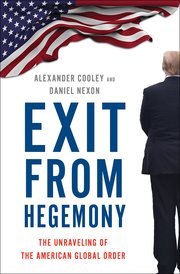 The unipolar moment has passed, and it isn’t coming back, according to Alexander Cooley and Daniel H. Nexon, the authors of Exit From Hegemony: The Unraveling of the American Global Order.
The unipolar moment has passed, and it isn’t coming back, according to Alexander Cooley and Daniel H. Nexon, the authors of Exit From Hegemony: The Unraveling of the American Global Order.
The United States lacks both the will and the resources to consistently outbid China and other emerging powers for the allegiance of governments. It will be impossible to secure the commitment of some countries to U.S. visions of international order. Many of those governments have come to view the U.S.-led order as a threat to their autonomy, if not their survival. And some governments that still welcome a U.S.-led liberal order now contend with populist and other illiberal movements that oppose it, they write for Foreign Affairs:
What U.S. policymakers can do is plan for the world after global hegemony. If they help preserve the core of the American system, U.S. officials can ensure that the United States leads the strongest military and economic coalition in a world of multiple centers of power, rather than finding itself on the losing side of most contests over the shape of the new international order. To this end, the United States should reinvigorate the beleaguered and understaffed State Department, rebuilding and more effectively using its diplomatic resources. Smart statecraft will allow a great power to navigate a world defined by competing interests and shifting alliances.
Another important shift marks a break from the post–Cold War unipolar moment. The transnational civil society networks that stitched together the liberal international order no longer enjoy the power and influence they once had, Cooley and Nexon add. Illiberal competitors now challenge them in many areas, including gender rights, multiculturalism, and the principles of liberal democratic governance. RTWT
Join @DCRES_Harvard, @HillmanJE, @CooleyOnEurasia and @KassenovaNargis for a Reconnecting Asia discussion of “Crony Capitalism” and China’s Belt and Road Initiative in Central Asia on June 25 from 10-11am.







